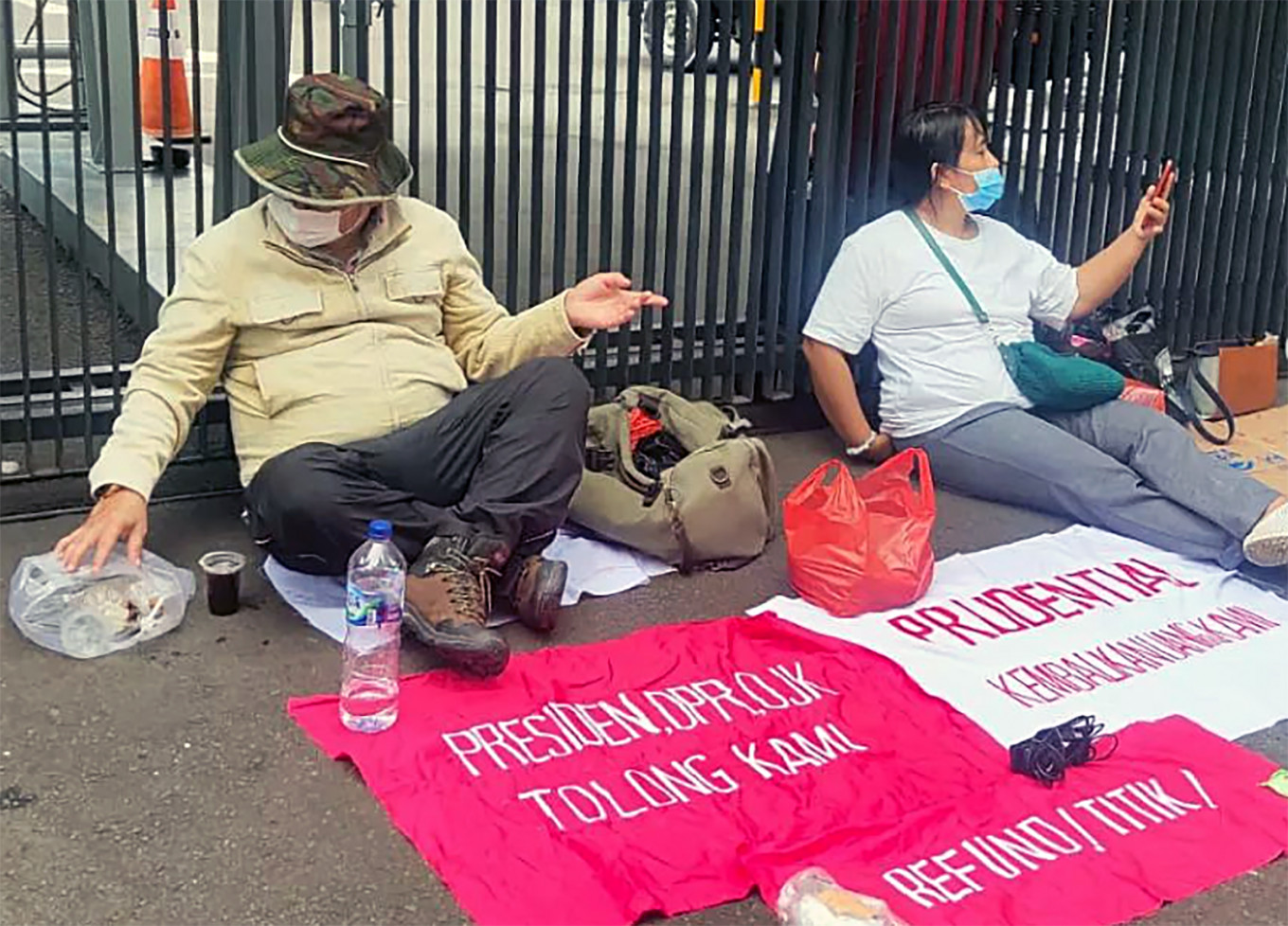Indonesians disgruntled over unit link insurance
A group of disgruntled unit link insurance policyholders have grabbed national media attention after holding protests at AIA, AXA Mandiri and Prudential Indonesia's offices in Jakarta.
Change text size
Gift Premium Articles
to Anyone

M
aria Tri Hartanti, 46, a housewife from Lampung, has lost a lot of money since becoming an investment-linked insurance policyholder in 2011, otherwise known as a unit link holder.
Agents from two insurance companies offered her a retirement savings plan and education insurance, promising high returns after five to ten years.
She found out in 2020 that both of her accounts had lost 60 to 65 percent of their initial values to Rp 32.6 million (US$2,270) and Rp 9.6 million, just as she wanted to cash out.
“Those agents only illustrated how our money would go up and up, but they did not tell us it could go down, and that risk is placed upon us,” Maria told The Jakarta Post on Jan. 26.
Maria had invested in unit link insurances, which combines regular insurance with an investment portfolio that fluctuates with the market.
Insurers came up with unit links to sell more insurance policies in a country with an insurance literacy rate of under 20 percent, but the firms’ frequent inability to deliver promised returns have left many consumers disgruntled.
Angered, Maria banded together with around 350 other unit link holders to demand a full refund over the alleged misselling and fraud, while also filing their cases to the police.
They protested at the headquarters of AIA, AXA Mandiri, Prudential Indonesia and the Financial Services Authority (OJK) in Jakarta, drawing national media attention, but claim to have only been offered a 50 percent refund with complicated terms and conditions.
Their demand to meet with the management of insurance companies also hit a wall, as they were welcomed with barbed wire and police protecting the insurance offices.
AIA, AXA Mandiri and Prudential said in a joint statement to Bisnis.com that they met with the policyholders, represented by Maria, in a series of meetings, including one on Jan. 12 facilitated by the OJK.
Prudential chief marketing and communications officer Luskito Hambali said the meeting was part of the companies’ effort to improve public trust in insurance services and products, including unit links.
“Unfortunately, due to the unconducive environment, the parties have not reached an agreement,” he said.
The companies reiterated their commitment to resolve all complaints through proper procedures, including discussions.
Limited awareness
Finance experts told the Post that such cases were a frequent occurrence stemming from limited consumer awareness about unit links, which have been overlooked by authorities and companies for years, allowing sales of such products to grow, business as usual.
Meanwhile, insurance agents, faced with high sales targets, are compelled to oversell unit links by promising consistent returns over the years.
“We have a literacy gap over the insurance industry when compared with banking. Many marketing agents have kept taking advantage of this ignorance,” said insurance analyst Irvan Rahardjo on Jan. 17.
“They know these people have adequate funds and decided to make them a target, despite knowing they might have inadequate knowledge about the product,” he added.
Indonesia’s insurance literacy only grew by 1.6 percentage points to 19.4 percent between 2013 and 2019, far smaller compared with banking literacy that grew 14.38 percentage points to 36.12 percent in the same period, Financial Services Authority (OJK) data show.
Read also: Financial literacy key
Unit links have long been the bedrock for insurers’ finances, comprising 62.5 percent of total life insurance premiums as of the third quarter of last year, according to the Indonesia Life Insurance Association (AAJI). The remaining 37.5 percent comes from regular life insurance or those without investments.
AAJI data show that life insurance investment revenue reached Rp 12.96 trillion in the third quarter of last year, reversing a loss of Rp 17.58 trillion seen in the same period in 2020, which was a challenging year for the entire economy.
The OJK consumer protection department said in April 2021 that the insurance industry had raked up the second most number of consumer complaints after banking, most of which were related to unit links.
Sularsi, coordinator for complaints and law at the Indonesian Consumer Foundation (YLKI), said on Jan. 18 that insurance agents and companies were responsible for ensuring that consumers understood their products, but that did not happen most of the time.
Many unit link policyholders did not realize that insurance firms were using monthly premiums to fund investments, bumping up coverage costs.
Consumers are also often promised particular yields but do not know that investments tend to fluctuate, so they could lose more money on top of monthly premium payments.
“Consumers have the right to acquire a clear and honest explanation, especially where their money would be placed, including the risks it might pose,” Sularsi said.
Sularsi also urged consumers to be careful about unit links sold through banks as sellers have mis-sold the product as something akin to a savings account.
She also advised consumers to meet insurance agents in person, instead of over the phone, so they could stay focused and make proper decisions.
However, improving consumer education might not be enough. Center of Economic and Law Studies (Celios) director Bhima Yudhistira said stopping the practice would require authorities to do their part in monitoring and taking action against violations in the insurance industry.
“Without proper regulation and action from the OJK, these unit-link problems will be prone to keep recurring,” he said.
Bhima suggested that it was best for the OJK to separate insurance and investment products due to low literacy among consumers.
Read also: Life insurance industry beats pre-pandemic revenue in H1
AAJI executive director Togar Pasaribu said on Sunday that the association was committed to providing education to consumers through campaigns, digital platforms and working with other stakeholders, including the government and the authorities.
He assured that the AAJI listened to all complaints, and that every insurer and the OJK had mediated every dispute. If consumers remained unsatisfied, they could take their cases to the Alternative Institution for Settlement of Financial Service Sector Disputes (LAPS SJK), before taking the matter to court.
Riswinandi, commissioner and executive supervisor of non-bank financial institutions at the OJK, told reporters on Jan. 27 that they were in the process of reforming the insurance industry, a process that started in 2017.
The reforms included tightening oversight over the governance, distribution channels and marketing of insurance firms, as well as evaluating and mitigating the risks of insurance products.
“We all understand that literacy in the insurance industry must be improved. People must be aware of the insurance products they buy,” he said.









